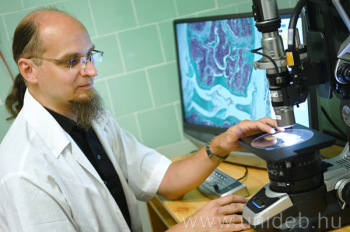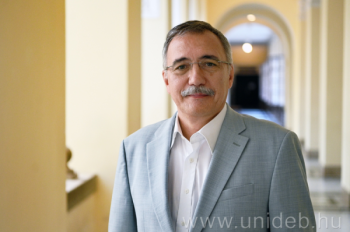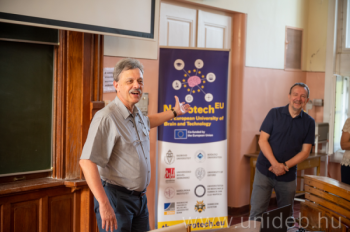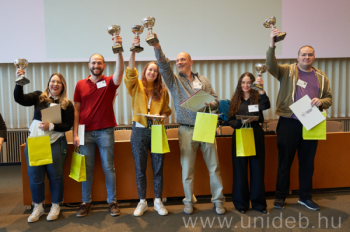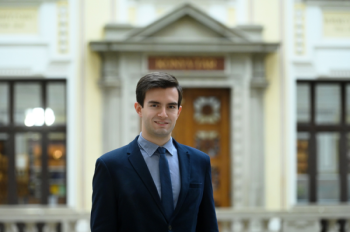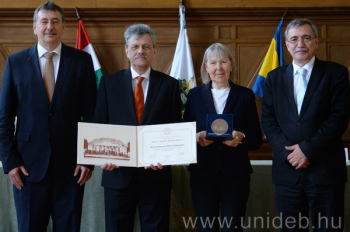Students of the University of Debrecen did pretty well at this year’s NeuroSpark Hackathon held in Elche, Spain. Our contestants, representing the Faculty of Economics and Business, the Faculty of Engineering and the Faculty of Informatics, competed as members of international teams focusing on potential solutions of problems related to the nervous system and managed to achieve significant results.
Hírek Medicine címkével
Basic research conducted by experts at the University of Debrecen into a special protein that plays a fundamental role in regulating cell functions may also contribute to the development of more effective anti-cancer therapies. Their discovery opens up new possibilities for influencing cell function without altering DNA. A paper summarizing the results of the research was published in the prestigious scientific journal Nature Communications.
Publications related to bone structure changes during cartilage loss have been collected, analysed and evaluated by a research group with the participation of Tamás Oláh, assistant professor at the University of Debrecen. Their scientific findings may help future research on this topic and may also be useful in healing. The article presenting the results of the research was awarded the Publication Prize of the Count István Tisza Foundation for the University of Debrecen and the University of Debrecen.
The findings of research conducted by experts at the University of Debrecen may facilitate the application of new therapeutic options in treating abnormal vascular formation. Abnormal retinal vascularization plays a major part in the development of a number of eye diseases. Researchers have observed that this process can be inhibited through the use of certain agents. The article that sums up the results of the research project, published in a prestigious international scientific journal, has been awarded Publication Prize of the University of Debrecen and Count István Tisza Foundation for the University of Debrecen.
The Department of Surgery of the University of Debrecen Clinical Centre organized a symposium entitled Robotic Surgery for Everyone (Robotsebészet mindenkinek) on the experiences gained since the launch of the Robotic Surgery Centre last April. The event, held at the Headquarters of the Debrecen Regional Committee of the Hungarian Academy of Sciences (DAB), was dedicated to a discussion of the place, role and results of robot-assisted surgery in clinical practice in Debrecen, including an overview of the particularities of each medical specialty.
Professor László Csernoch, Deputy Rector of the University of Debrecen and Director of the Institute of Physiology of the Faculty of General Medicine, was elected as member of the Executive Board of the Federation of European Physiological Societies (FEPS) at its September meeting in Tallinn.
Participants of a 5-day summer school launched at UD on Monday can learn about preparations required before the electron microscopy studies of tissue samples and about how to manage the related practical problems. The course, which was organized by NeurotechEU, an international university cooperation programmed, is attended by 14 students from 9 countries, as well as laboratory professionals and assistants.
The fifth Rectors meeting of the European university consortium NeurotechEU, established to enhance cooperation in the field of neuroscience in a broader sense, was held in the Swedish capital. At the NeurotechEU Hackathon competition, introduced as a supplementary event, an international team, which included a researcher from the University of Debrecen, won first prize with their proposed solution to treat mental illnesses in young people.
A student of the Faculty of General Medicine of the University of Debrecen achieved an outstanding result in the Polish capital at the international congress of medical students conducting research. Mihály Székely, who is a member of a research group in Debrecen working on the fight against tumors, won in his own section.
In recognition of her revolutionary achievements in the treatment of neonatal diabetes, Professor Dame Frances Mary Ashcroft of the Institutes of Physiology at the University of Oxford was awarded the "Debrecen Prize for Molecular Medicine" in 2020. Due to the Covid pandemic, the British professor conducting research into the physiology of ion channels was only able to accept the award of the Faculty of Medicine of the University of Debrecen this year from László Csernoch, vice rector for scientific affairs and László Mátyus, dean of UD.


